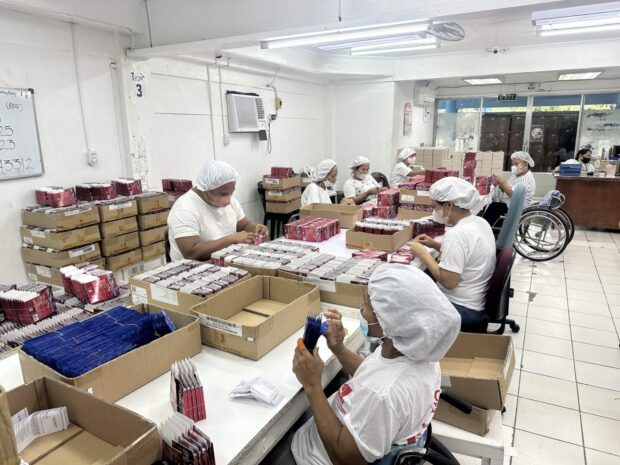It is typical for Filipinos to keep a stash of paracetamol handy along with other common medicines. Chances are, this medicine kit almost always includes a product from the country’s leading pharmaceutical company, Unilab, Inc. which has over 350 brands of trusted vitamins and medicines.
What people may not commonly know is that while Unilab has been quietly supporting the health of millions of Filipinos, they too have made significant efforts to support persons with disabilities (PWDs) over the years.

The latest available data from the National Disability Prevalence Survey done by the Philippine Statistics Authority in 2016 shows that around 12% of Filipinos aged 15 and up have experienced severe disability, while 47% have experienced moderate disability. This insight tells us that a considerable portion of the Philippine population has some kind of disability, ranging from physical, mental, and/or sensory impairments.
Unilab, through its various groups, has made supporting PWDs one of its key advocacies, with one program spanning a three-decade partnership. The effort began with the noble intention of bridging PWDs with job opportunities to help capacitate their ability to support themselves.
Fusing empowerment with quality work
For 36 years now, the company has developed a strong partnership with non-stock, non-profit, and non-government organization Tahanang Walang Hagdanan, Inc. (TWH). With this partnership, both parties have been able to help each other out in the long-term: TWH assists Unilab with manpower needs for product packaging, while Unilab continues to provide livelihood opportunities to members of the TWH community.
Situated in Cainta, Rizal, the TWH workshop houses Unilab’s products and serves as the primary packing operations hub for major Unilab brands. PWDs significantly handle these operations, preparing supermarket packs and physician samples for products such as Biogesic, Ceelin, Solmux variants, Diatabs, Decolgen, and ImmunPro.
At present, TWH employs 95 individuals through the partnership, with 70 being PWDs and 25 being able-bodied workers. The total number of employed has significantly increased from just 66 PWDs in 2015.
Unilab follows a 70:30 ratio of PWDs to able-bodied workers to ensure efficient work processes and provide necessary support to PWDs in their daily operations within the workshop.
Notably, Unilab was the only one among TWH’s workshops that continued to generate income for PWDs during the height of the COVID-19 pandemic in 2020. The funding is allocated for the wages of PWDs, operational and maintenance expenses, and compensation for other manpower requirements. Beyond this, Unilab also covers the utility bills for their two workshop stations and provides support during calamities, offering relief goods and assistance for property repairs.
Marcos Rabasto, who started working for Unilab through TWH at the onset of the COVID-19 pandemic, says he is able to provide for his family well because of his job.
“Napakalaking tulong po lalo sa aming mga may pamilya dahil dito po namin kinukuha ang aming pambayad sa upa sa bahay, pangpaaral sa aming mga anak. Noon nga pong pandemic ang Unilab lang ang tuloy-tuloy na nagbigay sa amin ng trabaho. Naabsorb pa nga nila yung ibang departamento na nawalan din ng trabaho noong pandemya.”
Alelo del Rosario, who has been working for Unilab through TWH for almost six years now, says Unilab has also helped them cultivate stronger bonds with one another and shape better work ethics. It is through Unilab that she has developed more malasakit (empathy) towards her fellow disabled persons who are striving to earn a decent living.
“Kung si Unilab nga nagkaroon ng malasakit sa amin, sa amin din dapat magmula yung malasakit sa kapwa namin PWD. Dahil sa opportunity na binibigay ng Unilab, ayaw po namin mawala. Kaya makikita mo gaano magbigay ng dedication ang mga tao sa trabaho nila kasi kung mawawala po [ang Unilab], wala na kaming aasahan so dapat pagbutihin namin,” she said.
She added that this opportunity made them feel valued, knowing that they are important and the work that they do is important. Unilab and TWH helped realize that their ability is not limited to what they can physically can or cannot do. She says this “family” has shown them that their well-being and happiness are just as important as their contribution to the company.
“Tinatanong po kami kung, ‘Kaya mo pa ba?’, madalas binibisita po kami tapos tinitingnan yung working area namin. Once a year may Christmas party kami. Parang hindi lang po puro trabaho, dahil ang turing nila sa amin pamilya na at laging parang laging espesyal kami,” said Alelo.
As with any kind of relationship, the partnership between Unilab and TWH stands strong through all seasons as the two groups working together allow for mutual benefits. Unilab is also at the receiving end of TWH’s loyalty and quality outputs from the workers.
“Kaya na rin napagkatiwalaan si TWH is because of the delivery commitment which is very critical to the marketing team. On time ang delivery and the quantity is in full. Hindi po nawawalan, hindi po nasisiraan, How they deliver, how they package, how they finish the product, that’s very important din siyempre for Unilab,” says Unilab Manufacturing Representative Mariatina Diaz.
Unilab’s partnership with TWH continues to grow over the years, driven by a shared commitment to the PWD community. Beyond just providing job opportunities, Unilab has created a sense of belonging, support, and family among its PWD workforce, fostering a work environment where dedication and empathy thrive. The PWDs are empowered and are assured that their work and contribution are just as important as the work that the able-bodied employees do.
This enduring partnership stands as a testament to the company’s dedication to both quality healthcare and social responsibility, embodying the hashtag #AlagangUnilab in action.
By fostering an environment where Persons with Disabilities (PWDs) are empowered, integrated, and valued members of the workforce, Unilab continues to champion its mission to uplift lives, promote social change, and build a brighter, more inclusive future for everyone.
ADVT.

